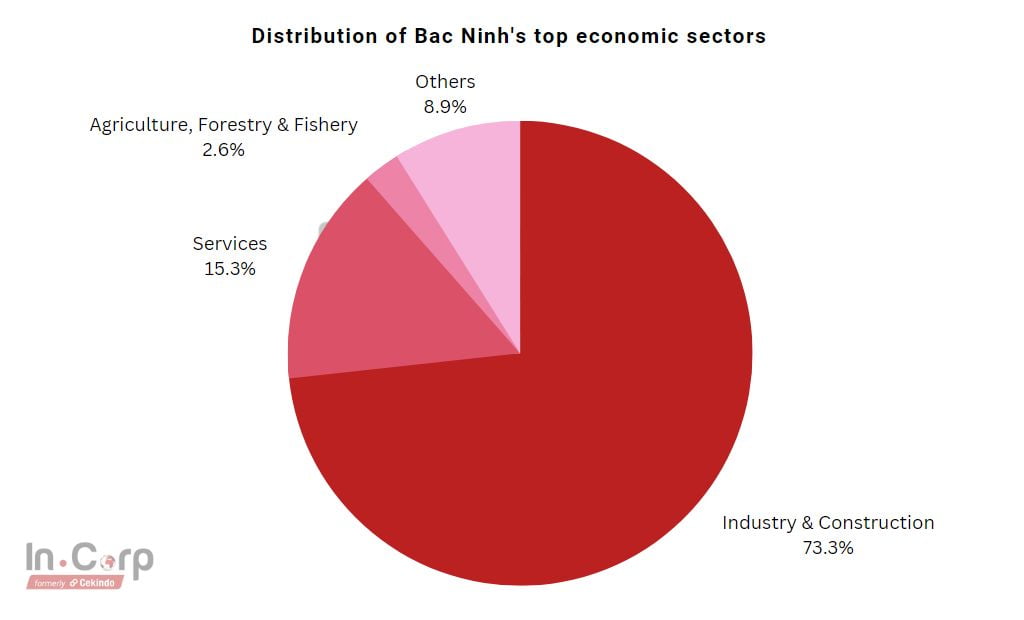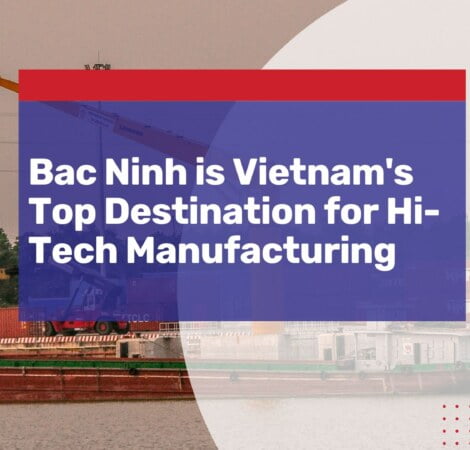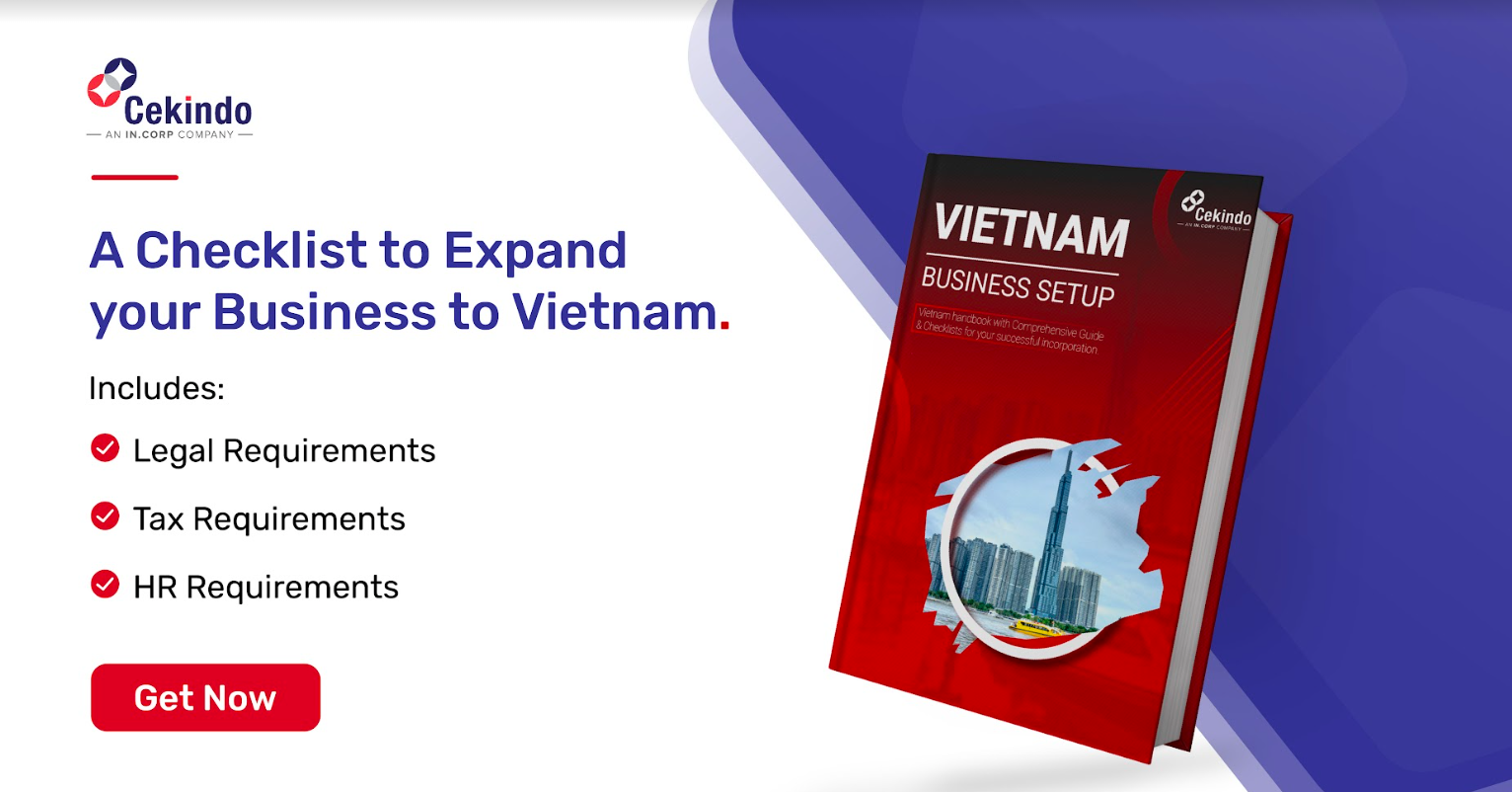Located in Vietnam’s Northern Key Economic Zone (NKEZ), the province and city of Bac Ninh present outstanding prospects for business setup and development. The province only stretches 82.6 square kilometers of land, making it the smallest in Vietnam. However, it is now known to be an FDI (foreign direct investment) hotspot, especially for high-tech products.
Bac Ninh’s History as a Manufacturing Hotspot
Since the late 1900s, Bac Ninh province has undergone significant urbanization and industrialization. Initially a purely agricultural province with underdeveloped infrastructure, Bac Ninh has turned into a modern manufacturing powerhouse. In 2021, its industrial production value reached nearly 1.5 quadrillion VND (close to 42 billion USD), and its gross regional domestic product (GRDP) per capita was ranked fourth nationally at 155.6 million VND.

Among its key economic sectors, over three-quarters of the province’s economy consisted of industrial production and construction. Many electronics and hi-tech enterprises have been choosing Bac Ninh to build factories on increasingly larger scales.
Apart from establishing a solid foundation for administrative functions and urban planning (especially in Tu Son city and Bac Ninh city), the province has implemented multiple industrial parks.
Industrial Parks
More specifically, Bac Ninh is home to 15 industrial parks, the largest of which are Thuan Thanh 3, Yen Phong 2, Nam Son – Hap Linh, and the Vietnam – Singapore Industrial Park (VSIP). There’s also an Information Technology Park in Tien Du District and over 30 industrial clusters.
Some of the largest manufacturers have set up factories in the province, such as Samsung Electronics in Yen Phong I, Canon in Que Vo, Microsoft Mobile in VSIP, and Hong Hai (Foxconn) in Que Vo. Enterprises from 38 countries worldwide, including the US, Japan, and Korea, have poured over USD 21 billion of FDI into Bac Ninh as of 2021 and another USD 2 billion in 2022 so far. Having said that, local authorities are still striving to foster even more foreign investment with numerous policies and projects.
What products are manufactured in Bac Ninh?
Samsung, Canon, Foxconn, and Microsoft all have factories in Bac Ninh, Vietnam, where they manufacture a range of high-tech products. Here are some examples:
- Samsung: Samsung has a large manufacturing complex in Bac Ninh that produces a range of electronics, including smartphones, tablets, and wearable devices. The factory also produces components such as camera modules and LCD screens. It has received over USD 9 billion in investment, and makes up much of Bac Ninh’s second-highest national export value.
- Canon: Canon has a production facility in Bac Ninh that produces a variety of office equipment, such as printers, copiers, and scanners. The factory also manufactures digital cameras and lenses.
- Foxconn: Foxconn, also known as Hon Hai Precision Industry Co., has a factory in Bac Ninh that produces electronic components and devices for a range of customers, including Apple, Dell, and Sony. The factory produces products such as smartphones, tablets, and computer peripherals.
- Microsoft: Microsoft has a factory in Bac Ninh that produces its Surface tablets. The factory also produces other electronic products for Microsoft, such as Xbox consoles and accessories.
Other companies that have chosen Bac Ninh for high-tech investment include Mobase (phone accessories, vehicle electronics), KCC (appliances), Hyosung (ATMs), and Goertek (acoustic components).
Overall, Bac Ninh has become a major hub for high-tech manufacturing in Vietnam, with these companies and others investing heavily in the area to take advantage of the skilled workforce and favorable business environment.
Future Aspirations
Bac Ninh’s authorities have pledged to continue supporting international and domestic businesses through:
- Committing to administrative reform and investment incentives (foreign direct investment in particular)
- Drawing high-quality investment in newer industrial parks
- Shifting the province’s focus to high-efficiency, high-tech industries
- Promoting a comprehensive supply chain with processing, manufacturing, and supporting elements
- Minimizing the need for outsourcing
Plans are in place to improve the efficiency of authorization and construction in industrial clusters and industrial parks, such as VSIP 2, Gia Binh, and Thuan Thanh.
Diversifying the supply chain is one of the highest priorities, especially when it comes to foreign businesses. Corporations and large enterprises can act as a catalyst for economic growth as they fuel the network of supporting businesses and domestic SMEs (small and medium enterprises).
We made the most detailed step-by-step guide to setting up a business in Vietnam for investors, now available as an interactive checklist:
Why Bac Ninh Should Be Your Next Destination for Manufacturing
Geography & geology
Located just east of Hanoi and less than 50 km away from Noi Bai International Airport, Bac Ninh province is prime real estate for placing a manufacturing plant. As part of the NKEZ’s economic trifecta (Hanoi – Hai Phong – Bac Ninh), the province allows its inhabitants to utilize its intrinsic advantages and integrate into the region’s growth portfolio simultaneously. Upon setting up in Bac Ninh, you also gain access to Vietnam’s biggest seaport (Hai Phong) and second-biggest airport (Noi Bai) for efficient cargo transportation.
Below are some of Bac Ninh’s nearby trading hubs.
| Hub | Distance |
| Hanoi | 50km |
| Hai Phong Port | 100km |
| Quang Ninh Port | 100km |
| Duong River Port | 1.5km |
| Tan Son Nhat Airport | 1,700km |
| Bonded warehouse | 6km |
The province’s geological survey reports far-stretching flatlands with stable geological structure (compressive strength exceeding 2kg/cm2), low groundwater level, and no floods or storms in the last 20 years. This means that investors will have peace of mind regarding the plant’s structural integrity and, consequently, minimal overhead expenses.
Infrastructure
Urban planning, land use optimization, and developing unified infrastructure were some of the plans laid out for Bac Ninh to become a modern industrial benchmark in this decade by the local authorities.
Bac Ninh’s infrastructure works for transportation in industrial zones include:
- Intersection of industrial zone with National Highway 18: up to 18m wide and 129m long
- Main transportation axis: section width of 50m (four lanes), road width of 8m (with 2m separator), and sidewalk width of 16m/2m
- Internal roads: road section width of 9-50m (two lanes), roadbed width of 8m, sidewalk width of 3m/8m
- Multiple bus routes linking nearby residential areas and industrial zones
There are also well-rounded power and water infrastructure:
- Voltage of transformer substation of the Industrial Zone: 110KV/22KV/0,4 kw
- Two transformers with capacities of 63 MW each
- Supply voltage to each factory: 22KV/0.4
- Voltage stability and minimized power cuts, thanks to a contract with the Electricity of Region 1 Bac Ninh and an independent power supply line to the Industrial Zone
- Clean water supply plant of Industrial Zone with a capacity of 4,000 to 10,000m3/24 hours, surface water treatment technology, inverter pump
- Capacity expansion plans to increase the capacity of each module to 2,000m3/24 hours according to the needs of investors
- Water supply pressure to factories: 2,5kg/cm2
Fire protection, construction planning, and waste treatment systems are all available, provided enterprises follow the industrial zones’ regulations. VNPT (Vietnam Posts and Telecommunications) and Viettel are two communications service providers already prevalent in the province.
Investments are being deployed to build an interconnected socio-economic infrastructure and promote PPPs (public-private partnerships) in the region. This strategy will help maximize efficiency and avoid budget bleeding while maintaining quality in the construction of pioneering projects.
RELATED: Vietnam’s Industrial Parks Ready to See FDI Inflow
Operating costs
As reported by TMX financial services, the costs of doing business in Vietnam are considerably lower than in other countries in the region. This is especially true for manufacturing companies, whose operating costs are estimated at less than USD 80,000 monthly as of 2021.
Supply chain interconnections
Emerging industries such as semiconductors and electronics assembly can benefit from Bac Ninh’s comprehensive supply chain ecosystem. As the province enhances its status in the high-tech global value chain, authorities are turning to manufacturers of phones, wearables, displays, and electrical parts as the target of research and development budgets. Supporting business lines in this sector are abundant: labor sourcing, real estate, transportation and utility services, etc.
Incentives for setting up in Bac Ninh
As Bac Ninh is covered with industrial parks, many companies that choose to set up here can receive tax benefits and land rental exemption. Specifically, they can receive tax holidays, tax reductions, and preferential tax rates. Here are
- According to Circular 96/2015/TT-BTC, manufacturing companies may be eligible for a preferential corporate income tax (CIT) rate of 10% for 15 years.
- According to Circular 151/2014/TT-BTC, inhabitants of industrial zones in socio-economically disadvantaged regions are entitled to two years of CIT exemption and a 50% reduction in the next four years.
High-tech industries, in particular, is subject to even more attractive investment incentives from the Vietnamese government.
- Up to a 15-year exemption from land rental (indefinite in some cases)
- Four-year corporate income tax (CIT) exemption, with a 50% CIT reduction in the next nine years and preferential tax rates thereafter (if eligible)
- Exemption from import duty
- Possible financial support according to the National Hi-tech Development Program and other funding programs
How to Set Up or Move Your Manufacturing to Vietnam
International investors and entrepreneurs have a variety of options to choose from in Vietnam’s fast-growing manufacturing industry. Aside from the manufacturing capital, Bac Ninh, there are industrial zones and clusters spread throughout Vietnam, such as Binh Duong, Ho Chi Minh City, Dong Nai, and Hanoi.
Here is the general procedure to set up a manufacturing company in Vietnam.
To start from scratch without a factory:
- Step 1: Register land rental, and the use of infrastructure and facilities
- Step 2: Submit an Environment Impact Assessment (EIA)
- Step 3: Obtain Investment Registration Certificate (IRC) and Enterprise Registration Certificate (ERC)
- Step 4: Inject charter capital according to the IRC and ERC
- Step 5: Register the design of the factory
- Step 6: Apply for fire protection
- Step 7: Build the factory
To start with an already available factory:
- Step 1: Obtain Investment Registration Certificate and Enterprise Registration Certificate
- Step 2: Inject charter capital according to the IRC and ERC
- Step 2: Sign and authorize a factory rental contract
About Us
InCorp Vietnam is a leading provider of global market entry services. We are part of InCorp group, a regional leader in corporate solutions, that encompasses 8 countries in Asia-Pacific, headquartered in Singapore. With over 1,100 legal experts serving over 15,000 Corporate Clients across the region, our expertise speaks for itself. We provide transparent legal consulting, setup, and advice based on local requirements to make your business perfectly fit into the market with healthy growth.
Don’t take our word for it. Read some reviews from some of our clients.

